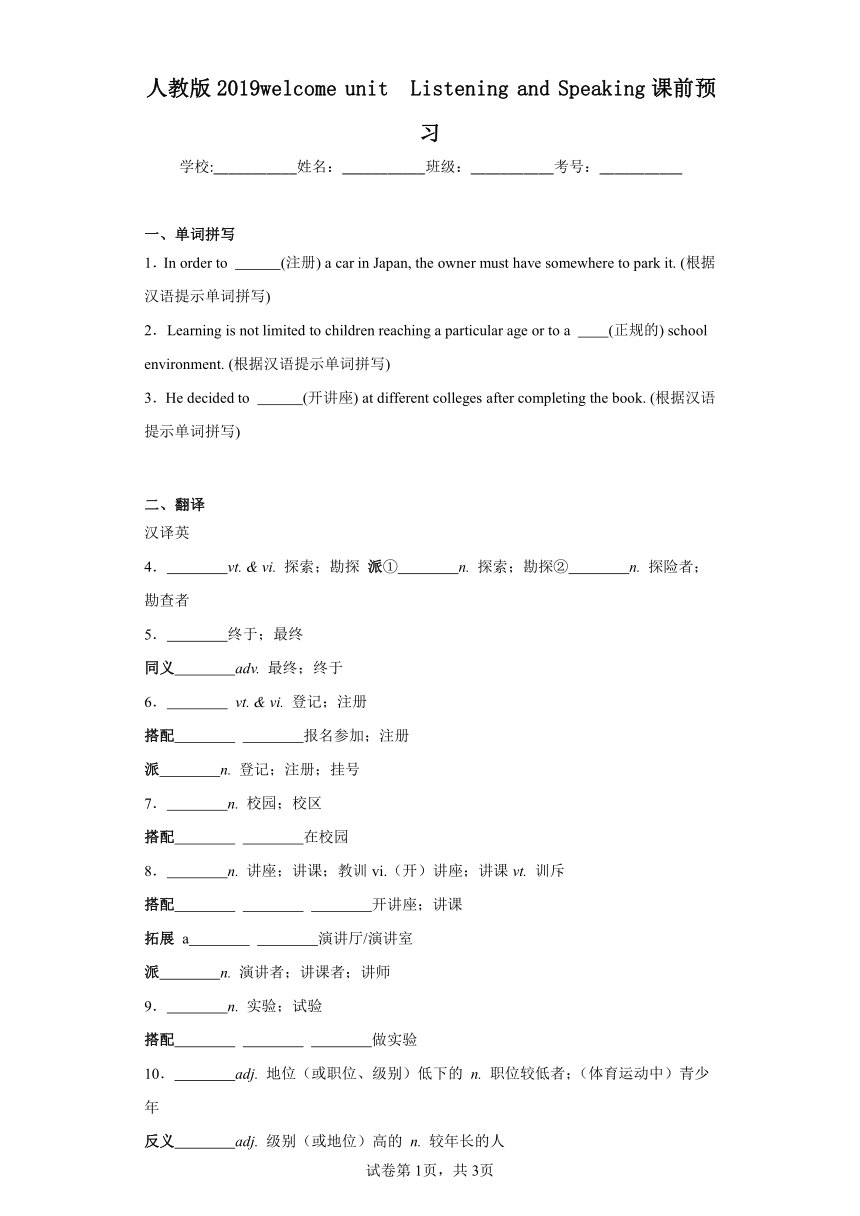
人教版2019welcome unit Listening and Speaking课前预习 学校:_____姓名:_____班级:_____考号:_____ 一、单词拼写 1.In order to (注册) a car in Japan, the owner must have somewhere to park it. (根据汉语提示单词拼写) 2.Learning is not limited to children reaching a particular age or to a (正规的) school environment. (根据汉语提示单词拼写) 3.He decided to (开讲座) at different colleges after completing the book. (根据汉语提示单词拼写) 二、翻译 汉译英 4. vt. & vi. 探索;勘探 派① n. 探索;勘探② n. 探险者;勘查者 5. 终于;最终 同义 adv. 最终;终于 6. vt. & vi. 登记;注册 搭配 报名参加;注册 派 n. 登记;注册;挂号 7. n. 校园;校区 搭配 在校园 8. n. 讲座;讲课;教训vi.(开)讲座;讲课vt. 训斥 搭配 开讲座;讲课 拓展 a 演讲厅/演讲室 派 n. 演讲者;讲课者;讲师 9. n. 实验;试验 搭配 做实验 10. adj. 地位(或职位、级别)低下的 n. 职位较低者;(体育运动中)青少年 反义 adj. 级别(或地位)高的 n. 较年长的人 拓展 (美国)初级中学 搭配 比……年龄小/级别低 11. ... 不打扰;不惊动 12. ... 要是……会怎么样呢? 汉译英 13. n. 性别 14. adj. 女(性)的;雌的n. 雌性动(植)物;女子 15. adj. 男(性)的;雄的n. 雄性动(植)物;男子 16. adj. 爱交际的;外向的 联想 adj. 悠闲的;随和的 17. n. 小伙子;男人;家伙 18. adj. 令人尴尬的;难对付的 19. adj. 正式的;正规的 反义 adj. 非正式的;日常的 20. n. 国家;民族;国民 派① adj. 国家的;国内的② n. [U, C]国籍[C]民族 三、单词拼写 21.To achieve our goal, we need to think out of the box to e every possibility. (根据首字母单词拼写) 四、选词填空 选用方框内合适的单词及短语并用其正确形式完成下面短文(每项限用一次)。 obviously, identity, hairstyle, selection, a variety of, experiment, sensible, nowadays Avatars are often cartoony pictures with facial features like the 22 , the clothing, and accessories (配饰) that allow you to personalize your picture. 23 a lot of websites give you the chance to represent yourself with an avatar rather than a picture of yourself. Can people judge your personality from an avatar you create This question was addressed in a(n) 24 by some researchers. Thousands of people took part and were offered a wide 25 of avatars to choose from based on the instructions given. The results were somewhat beyond people’s expectations. In general, the aspects of avatars that people thought were most important for judging a person’ s personality did not accurately describe their 26 . According to the research, the main reason is that some people generally try to select avatars that represent themselves correctly while others aim to show themselves in 27 different ways to the electronic world from what they appear in real life. So, what did the results mean Generally, people 28 prefer to draw inferences (推论) about characteristics from avatars. However, the aspects of the avatars that they use to make judgments about someone’s personality are not necessarily 29 . Thus, people may overestimate (高估) their ability to learn something about others from avatars. 五、语法填空 语法填空 Hero writer who wrote of ... ...
~~ 您好,已阅读到文档的结尾了 ~~

